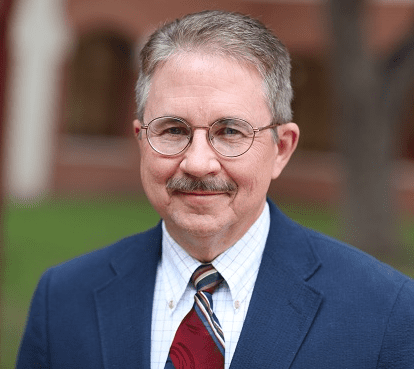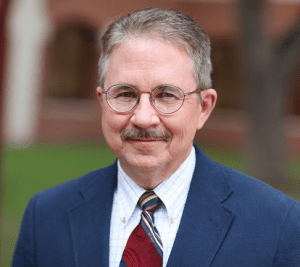There are many today who think the terms “heretic” or “heresy” or the concept of “counterfeit Christianity” are out of place. Many think such terms are not part of our tolerant Western world and therefore, the assumption is, not part of our Western churches and beliefs. Others compound this problem by pointing out the diversity of beliefs among existing and acceptable churches: Presbyterians, Wesleyans, Baptists, Anglicans … and on and on.
But very few Christians today don’t have some opinions on what is consistent with Christianity and what is not. Most today think strident and systemic racism contradict Christian belief and practice. Most think, too, that denial of God-in-Christ is inconsistent (at best) and then there are those who claim to be Christians who don’t ever ask God for forgiveness. My point is only that most Christians are willing to raise the red flag sometime.
 Someone who can guide us into this discussion of heresy and orthodoxy is Truett’s exceptional theologian, Roger Olson, in his new and valuable book, Counterfeit Christianity: The Persistence of Errors in the Church.
Someone who can guide us into this discussion of heresy and orthodoxy is Truett’s exceptional theologian, Roger Olson, in his new and valuable book, Counterfeit Christianity: The Persistence of Errors in the Church.
Here are a few points; the first being that you can’t have heresy until you know what orthodoxy is. I would contend — and I assume Roger would agree — that the demise of interest in heresy flows from a demise of interest in orthodoxy. If one doesn’t see the value in orthodoxy, one will have little interest in heresy. Hence, Roger say,
Heresy depends on orthodoxy. Orthodoxy is theological, doctrinal correctness—right belief. Heresy is teaching (not just mistaken belief) that denies orthodoxy (3).
But, heresy is not a term useful except for something important and deep in the Christian faith:
In other words, heresy is serious, not minor, doctrinal error. It is, as will be explained throughout this book, error that strikes at the heart of the gospel of Jesus Christ. Every Christian denomination and church has some sense of orthodoxy whether they use that word or not. They all have some common belief and its ground, foundation, and structure is what C. S. Lewis called “mere Christianity” in his famous book by that title. Think of common Christian orthodoxy as “mere Christianity.” I strongly recommend reading that book or one like it (another is G. K. Chesterton’s Orthodoxy) to get a sense of what Christians have traditionally believed about God, Jesus Christ, the gospel, and salvation (3).
There is, in fact, lots and lots of counterfeit Christians today and lots and lots of heresies.
On the other hand, we live in a world full of counterfeit Christianities—belief systems and doctrines that claim to be Christian and very seriously conflict with the gospel of Jesus Christ (3).
Olson has this to say and will show it time and time in the book:
I have found all the real heresies (not everything someone calls heresy) unbiblical, illogical, and spiritually destructive (4).
Our world today, of course, doesn’t want to let loose a bunch of heresy hunters and the internet has made this easy game — I’ve seen it time and time again. It’s said and it’s divisive and it’s often the crank on a perch that gets the ball rolling on accusations. But this issue of heresy matters and the process of investigation is often done well:
But not all defenders of Christian orthodoxy have conducted heresy hunts or inquisitions; many have been loving and kind toward those they considered wrong in their beliefs even when they have had to correct them (4).
Typically, “fundamentalists” are those Christians of various denominations who o tend to consider all their churches’ beliefs as essential (6-7).
The big picture must be kept in mind — the principle of non-contradiction:
If there is one major presupposition lying within this book it is that if Christianity is compatible with anything and everything, it is nothing. In other words, if Christianity is compatible with any and every belief, then it is meaningless (5).
Doctrines that blatantly deny those common, essential Christian beliefs that go back into ancient Christianity, that are somehow or other rooted in the New Testament itself, and that were expressed in the early Christian creeds are the ones we are most concerned with here. Or, to be more precise, we are mostly concerned with their denials—heresies that reject them and are taught nevertheless, sometimes, among Christians (7).
The BIG QUESTION:
So what makes a person a true heretic? First, the person has to be teaching heresy to others. A person cannot be a heretic only in their own mind. They only become a heretic when they instruct other people in their heresy. Second, the person must know what they are teaching is heresy to their own faith community. In other words, a person cannot be a heretic totally outside of his or her faith community. Technically speaking, a person should never be called a heretic unless he or she fits the following: (1) is a member of a faith community and teaches against its orthodoxy, and (2) knows the doctrine he or she is teaching conflicts with the faith community’s orthodoxy (10).
All of that is to say that the label heretic is not necessarily inseparably attached to heresy. A person might very well believe in or even teach heresy out of ignorance. Once they are informed that what they are teaching is heresy and they continue believing or teaching it within that faith community, then they are a heretic. In other words, being a heretic is always presumptuous— never accidental or unconscious (11).













